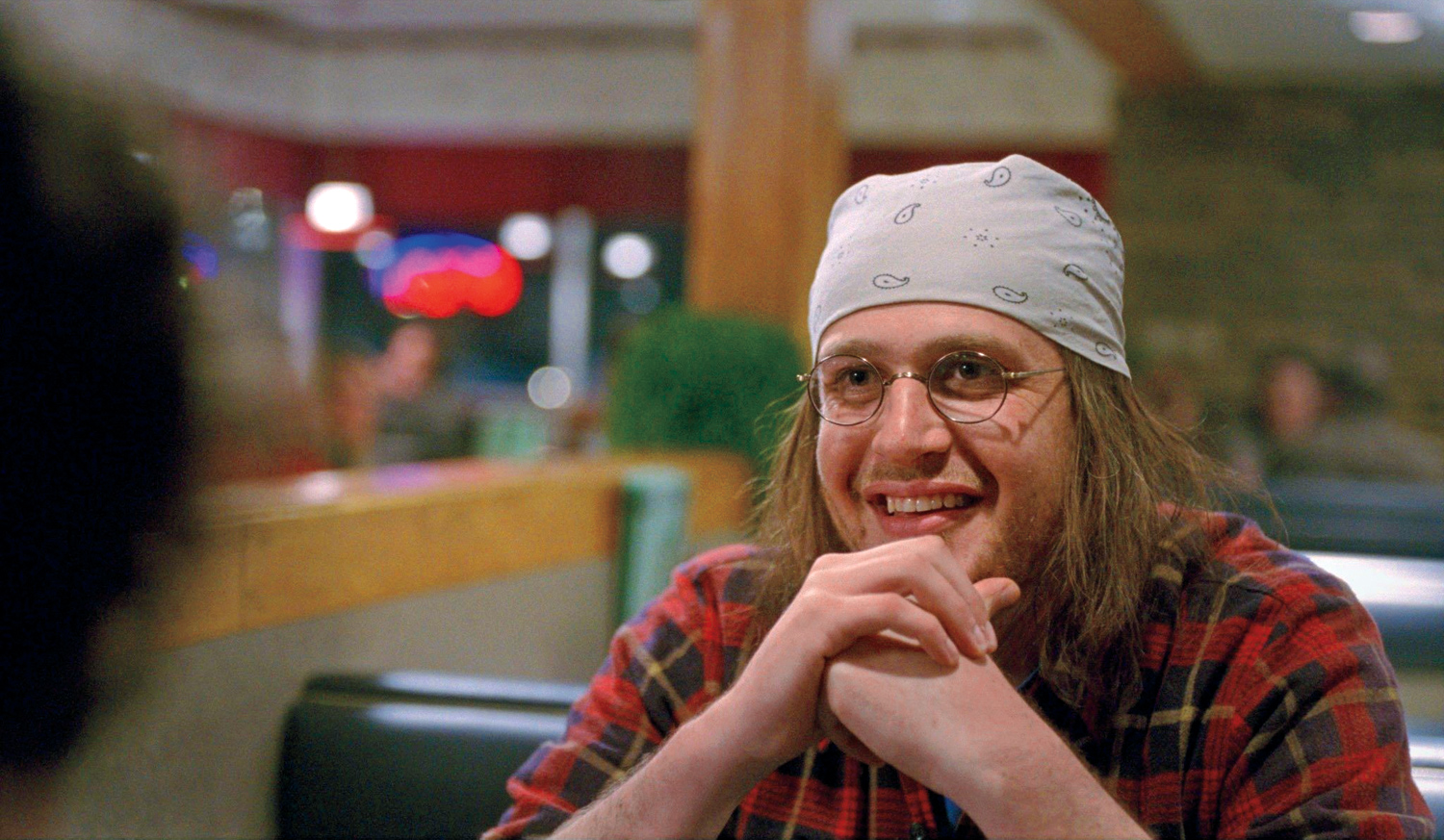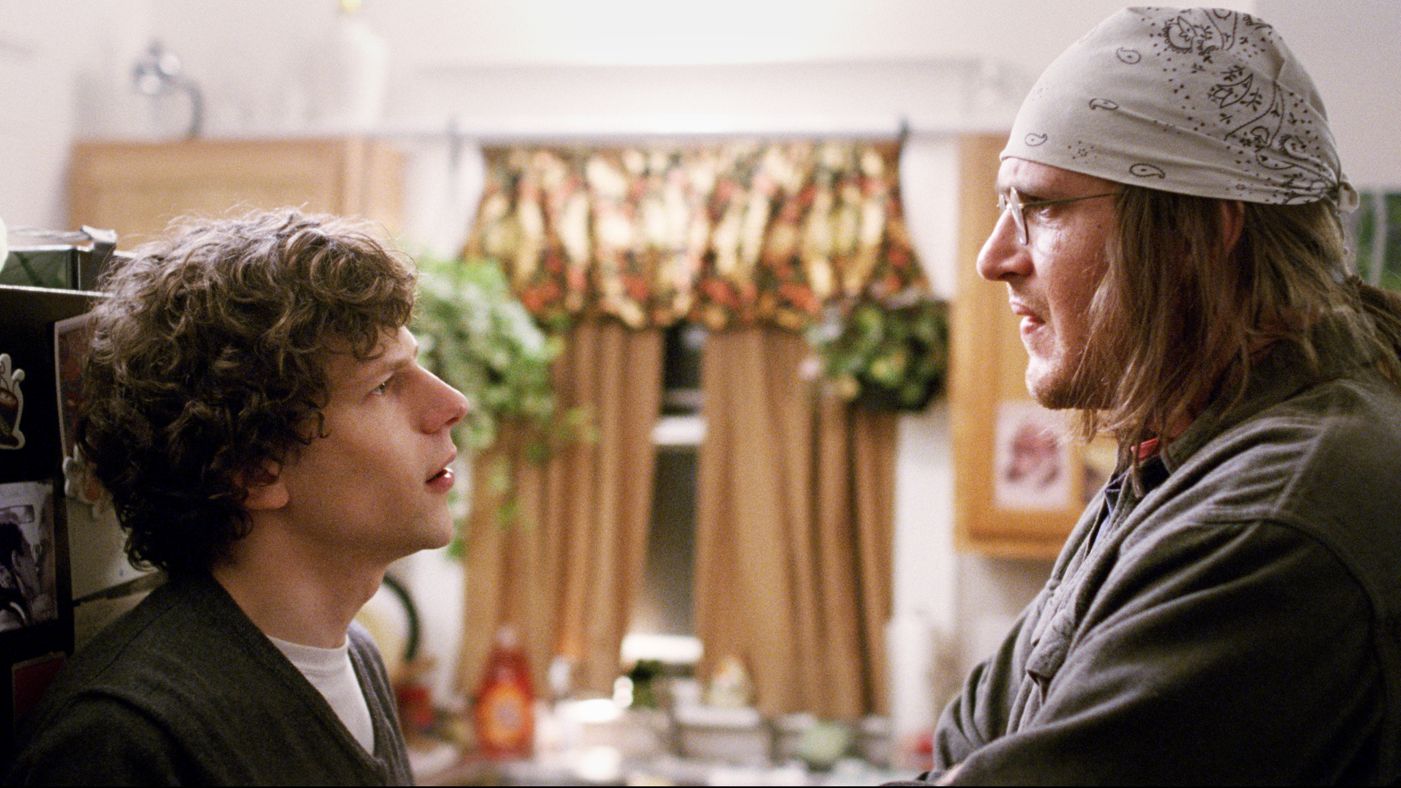The End of the Tour
 Scott Pfeiffer
Scott Pfeiffer  Sunday, August 30, 2015 at 12:58PM
Sunday, August 30, 2015 at 12:58PM 
Suffused with an elegiac melancholy, the latest film from James Ponsoldt ("The Spectacular Now") takes as its subject not so much the late David Foster Wallace as the loneliness that suffuses life. It is a beautiful film: the biopic as paragraph. Its central mystery, seen through the eyes of a young, middlingly successful writer, David Lipsky (Jesse Eisenberg), is how a man can achieve the very pinnacle of the writing profession--not in terms of sales necessarily, but in terms of writing his generation's most mighty and innovative novel--as Wallace did, and still not be a happy man. Wallace is played in an honest, moving turn by Jason Segel as a man for whom integrity was his overarching, tortuous project, and who couldn't find peace for his unquiet, fine mind.
As most people know, Wallace committed suicide in 2008. I did not know the man, except from his work--and the extent to which we can know the writer through the work is one of the ideas with which the movie grapples--and so I should be wary about making any claims about him or why he did what he did. He probably couldn't have said why he did it himself, or at least not without unpacking it at book length. Instead, I will try to restrict my comments to "David Foster Wallace" as he appears as a character in this movie.

The year is 2008, and Lipsky gets the news about Wallace's suicide. He goes to the closet and takes down a box, removes a cassette tape, pops it into a walkman. As he hits rewind, we are borne back twelve years. Now It is 1996, and Wallace has just dropped "Infinite Jest." It's the talk of the town in Lipsky's NYC neighborhood. Lipsky himself has a novel out, which is a heck of an achievement, I'd say, even if the book didn't exactly set the world on fire. He is also a reporter for Rolling Stone. Thus, the writing career appears to be going pretty well, you would think. And yet Wallace is everything Lipsky wants to be and knows he is not. He invents a plum assignment for himself: covering the last five days of Wallace's book tour for "Infinite Jest." His editor flies him out to Minnesota. (Joan Cusack plays the local author handler, all guileless and Minnesota-nice.)
As Lipsky wields his tape recorder, Wallace tries to be affable and honest, yet he's deeply skeptical about the whole project. He worries what he says is easy or trite. He worries he doesn't have all the answers, like Lipsky expects him to. He tells Lipsky, the image you construct in this profile won't be me. He's acutely aware that Lipsky is a journalist, and, as such, will craft the stuff of real life into a false image, some kind of romantic idea of self-destruction. You can't help but worry that this movie itself is an example of that very phenomenon, and so you admire the extent to which it does *not* do that, the way the screenwriter, playwright Donald Margulies, resists imposing an artificial shape on the material. Even a story arc that has the two men hit that low point that is a prerogative of script structure feels natural, as they fall out almost completely over Lipsky's flirting with his ex-girlfriend (Anna Chlumsky).

Since what we're seeing is Lipsky playing his tapes back in his head, almost every time we see Wallace it is through Lipsky's eyes. His point of view is evoked by cinematographer Jakob Ihre with a camera style that deploys just a taste of the hand-held. Ihre paints in a palette of flat light--the light of convenience stores, diners and hotel hallways--and in cold sunlight. As we drive across the countryside of Bloomington, Illinois where Wallace chose to live, the lonely, wintry landscapes seep into you.
I was initially rather a skeptic on Segel as Wallace. Something was ringing wrong for me: he seemed slightly soporific, and I kept seeing, not Wallace, but Jason Segel in a bandana. As the film went on though, he disarmed me, utterly. The soft, hesitant cadences of his speech seemed right for a thoughtful man who treasures his "regular guy"-ness, who is self-effacing about his own genius to the point that, if anything, it seems to torture him. Even Segel's huge body is right. He's a big sad-sack, sweet and shy, a slumped, shambling guy lurching through the snow. A guy who loves his pooches, whose once athletic form--he had been a competitive tennis player--has gone soft under layers of too much junk food, too many cigarettes. Lipsky is as happy as a pig in shit when he's chain-smoking and scarfing Twinkies and McDonald's with the great man. Eisenberg is just the right actor to play Lipsky: awkward and nervous, weaselly and wheedling, jealous and ambitious.
Wallace has an addictive personality, and his particular seduction is trash: TV, action movies, junk food. As Wallace and Lipsky roll through an American landscape of strip malls and fast-food joints, tooling around in the front seat of Wallace's beat-up old car, they listen to a mix of pop songs, great ones like Tracey Ullman's "They Don't Know." At one point they visit the Mall of America, that peculiarly American consumer playground, with its roller-coaster. He loves trash culture, yes, but he is troubled. What if trash is increasingly all we consume, as Americans? Wouldn't that be a problem?

And so the movie is about a particularly American dream--that achievement will make you happy--and a particularly American depression, which finds its expression in the beautifully melancholy, somehow healing soundtrack. There is R.E.M.'s "New Orleans Instrumental No. 1" and Tindersticks performing that Pavement ballad "Here," suffused with so much world-happiness, and so much world-sadness. There is a score by Danny Elfman, channeling his "inner Eno," as Ponsoldt has put it, that is itself a form of cold sunlight.
Margulies's script is based on the book "Although of Course You End Up Becoming Yourself," Lipsky's transcripts of his Wallace tapes, and the talk in "The End of the Tour" is a dance and a boxing match that sustains the movie's 106 minutes. The two men circle each other, enthusing over Alanis Morissette, joking, playing mind games on themselves and the other, painting themselves into corners, looking for ways out of those corners, ways to define themselves--trying on masks, and experimenting with what it might be like to live without them. Trying to get to the heart of the matter. Words as jails we build for ourselves, and words as a way of breaking out of those jails, to be free.
Wallace tells Lipsky that his work seeks to grapple with the strange conundrum of "people like us." Mainly white, over-educated: people who have been given every opportunity and advantage in the world. And so why aren't we happy? That's the great mystery of the film: how can the voice on the page be so strong (and it was, I remember), and the writer himself so broken? As Karolyn said to me after the movie, in a line that summed it up beautifully, "Depression is the loneliest illness."
Maybe the real Wallace would have hated "The End of the Tour." It probably would have made him very uncomfortable. However, a part of me likes to imagine that maybe he would have seen something in Segel's empathetic take, his portrait of this man who was--always--very open. A man for whom books were a means to connect to other people, to stave off life's loneliness. And maybe he would have said, you know, I kind of like him as me. There is a moment in the movie when Wallace asks Lipsky to imagine, if he can, something that could be so terrible that it's better to leap out the window--even if that means your death--than to stay in the room with it. In my imagination, the real-life Wallace hears that and thinks to himself, yeah, okay. They get me. They get it.
Rating: ****
Key to ratings:
***** (essential viewing)
**** (excellent)
*** (worth a look)
** (forgettable)
* (rubbish!!)


Reader Comments